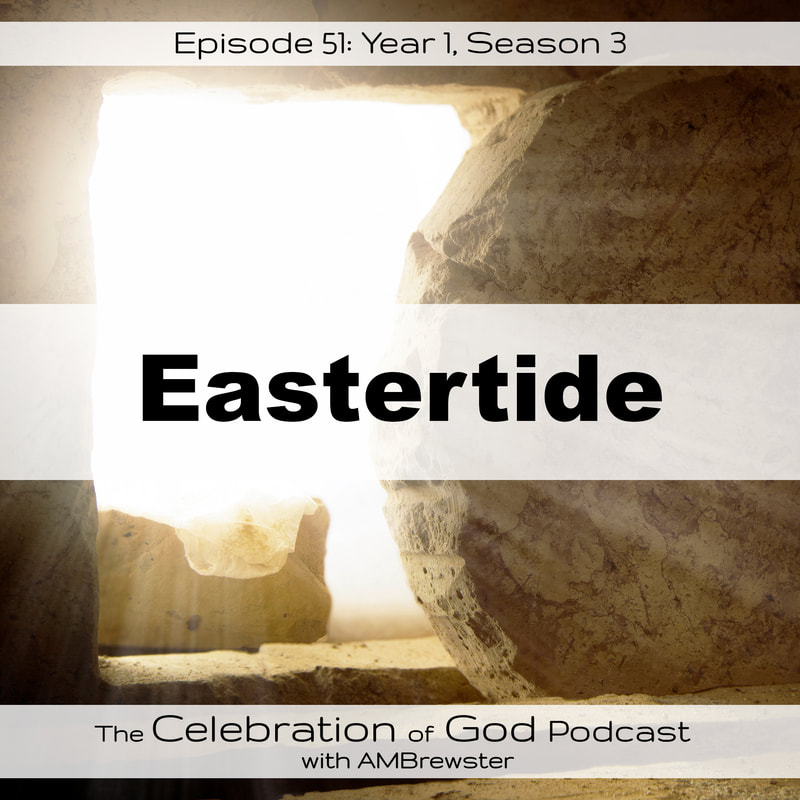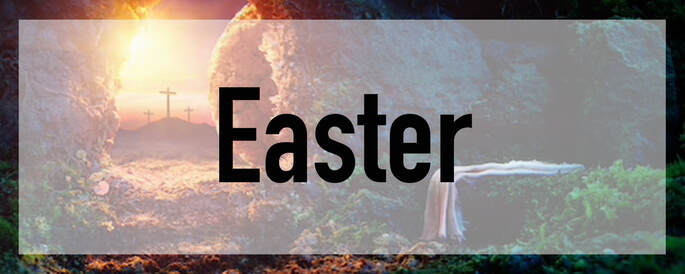|
Easter may be over, but Eastertide is just beginning! Join AMBrewster as he helps disciples of Christ give the God of Easter the attention, worship, and preeminence He’s due!
The Year Long Celebration of God is a family resource from Truth.Love.Parent., a ministry dedicated to rooting families in God and maturing families for God so they can harvest blessings from God. Like us on Facebook. Follow us on Instagram. Follow AMBrewster on Facebook. Follow AMBrewster on Twitter. Follow AMBrewster on Instagram. Click "Read More" for today’s Episode Notes and Transcript. Are you new to the Celebration of God? Click here for your first steps.Episode Notes
Click the link below to download the PDF.
TranscriptIntroduction
If you are new to The Celebration of God, thank you for dropping by. I hope this podcast will make it into your weekly lineup. I know there are an almost infinite number of things you could be doing with your time, so the fact that you’re spending it with us is a big deal, and I appreciate it.
The Year Long Celebration of God is a discipleship experience designed to equip us to Love God and others in the best way possible. The best way to love others is by loving God first and foremost, and the best way to love God is by giving Him the preeminence in our lives that is due Him. And today we’re going to continue our discussion about the biggest feast day on the Christian calendar. But before I do that I thought it would be fun to rank my top three Easter candies. In third place, I love jelly beans. You know, the regular old-fashion jelly beans — not the spiced ones, not the weird flavors — the original jelly beans. Of course, speaking of flavors, I’ve never been a fan of the white ones, but I could eat a whole bag of the black ones. So, if you are the kind of person who hates the black jelly beans, I will sacrifice myself to serve you by taking those jelly beans off your hands. You can send them to 53 Cherry St., and they will be summarily consumed. In second place, I love the Cadbury Mini Eggs. You know the ones with the pastel candy shells with Cadbury chocolate on the inside. In my humble opinion, Cadbury makes the best chocolate. And that’s why my number one favorite Easter candy of all time is the Cadbury Cream Egg. In fact, Cadbury Cream Eggs are my favorite candy in the whole world. But it has to be the regular-sized eggs. The mini Cadbury Eggs just aren’t the same. No, this is not a paid endorsement of Cadbury. It’s just me sharing with you my favorite candies you can only get around Easter. And the moral of this story is if your household is overrun by any of those candies, I will graciously remove any temptations you may be experiencing. And now, let's talk about Eastertide. Topic
If you’re just joining us, you may not know that The Celebration of God approaches the Christian holiday calendar from a distinctly protestant worldview. That means that we often will not observe or celebrate various holidays in all the same ways non-protestants do.
But there are a number of holidays (and approaches to those holidays) on which I think the modern protestants are missing out. And Eastertide is one of them. Most modern protestants celebrate one day of Easter, but did you know that Eastertide spans 50 days from Easter through the Saturday before Pentecost? And — guess what — the whole 50 days is considered one giant feast! From my experience, too many protestants don’t give Easter the focus they should. And this is a great way to adjust our thinking. We celebrated Creation for one week and Christmas for twelve days, so if we celebrate Easter for 50 days . . . I think we may be able to reverse that trend and give the God of Easter the attention He’s due. So, today I’m going to talk about the other special days that are encompassed by Eastertide, and I’m going to finish by explaining how we can participate in a 50 day festival without being burned out or distracted. 1. The Special Days of Eastertide Obviously, Easter Sunday is the biggest, and we spent the past three episodes talking about how to worship God on that day. But the second through seventh Sundays of Easter are also great opportunities for continuing the celebration of our great God’s sacrificial atonement and destruction of death. Historically, all seven Sundays were celebrated as heartily as the first. And we’ll talk about some interesting ways to do this in a minute. And speaking of the Seven Sundays of Easter, what makes this year interesting is that the historical celebration of the Resurrection — on April 25th — happens to land on the Fourth Sunday of Easter. If you missed our two-part “Confusion of the Crucifixion” episode, you may be wondering how we can know the date Jesus rose from the dead. You should definitely check out those two episodes to learn. Now, since the Easter season is tied to the Jewish calendar, it jumps around a lot from March 22nd through April 25th. In my book, the years that the First Sunday of Easter lands on the 25th are uniquely special. Of course, the other holidays scheduled from April through June can find themselves wrapped up in Eastertide as well. Everything from Stewardship Day on April 22nd, Mother’s Day on the second Sunday in May, and even International Children’s Day might fall within the scope of Eastertide — or even fall on one of its Sundays. For example, this year, Mother’s Day falls on the Sixth Sunday of Easter. But allow me to back up just a little bit because I got a little ahead of myself. Before the historical observance of Easter on April 25th, we have Stewardship Day on April 22nd. Most people know April 22nd as Earth Day, and I plan to do a full episode next time explaining how Stewardship Day is both similar and different as well as providing different ideas for celebrating God on that day. So, this year Eastertide encompasses Easter Sunday, Stewardship Day, the historical Easter, Mother’s Day, and Ascension Day. Ascension Day is traditionally celebrated on the sixth Thursday after Easter, however some people observe it on the following Sunday, the Seventh Sunday of Easter. The Celebration of God celebrates Ascension on the 40th day of Eastertide because the Bible says that Christ ascended 40 days after the He rose from the dead. But we’ll talk more about Ascension later. And then Pentecost is the day right after the 50th day of Eastertide. And — of course — we’ll talk much more about Pentecost later as well. It’s a really great opportunity to celebrate a gift of God that we far too often take for granted. Now it’s time for a little math. Eastertide is a 50 day period which includes 6 unique holidays that may or may not fall on the special Seven Sundays of Easter. But I’m sure the more pressing question is how on earth are we to navigate those 50 days all to the glory of God? 2. Worshipping God for 50 Days First of all, we need to put on our grownup name tags and grapple with the ridiculousness of the question I just posed. God deserves our worship every single moment of every single day from the moment we’re born into the eternity of infinitude. We don’t get a break from worshipping God. He should always be the preeminent focus of every word, deed, feeling, thought, desire, and belief. So, no, intentionally worshipping God for 50 days is no more difficult than any other Christian responsibility because we’re to be celebrating Him every other day as well. But, I do recognize that human beings don’t do sustained high energy activities well. That’s why we often feel like we need a vacation from our vacations. We go and go and try to cram all of this high-intensity fun into our vacations, and we just end up wearing ourselves out. Yeah, it’s fun, but it’s exhausting. And I think that most people imagine celebrations and feasts and High Holy Days to be taxing because they require our energy in a similar way that vacations do. On the other hand, some people think about the fact that since many American holidays involve taking off work how could anyone survive not working for 50 days? That’s not sustainable either. But both of those approaches to this discussion will only lead people down the wrong road. If high-energy breaks from work are how we define The Celebration of God, we really don’t get the point. First, we must be reminded that God is to be worshipped just as fully in the mundane low moments of every day life as He is in the High Days of celebration. He’s to be worshipped while we’re working and playing and eating and parenting and everything else-ing. Worship is investing in God the worth and value that He’s due. So, whether I’m eating a feast or scarfing down a snack, I should be doing so to the honor and glory of God. And the same is true whether I’m taking a break from work or smack in the middle of the hardest work week of my life. I need to present myself a living sacrifice in each of those circumstances. However, even if we understand that — and are striving to make it a reality — those of us who are used to celebrating Easter on one day may find it difficult to know how to celebrate it for 50 days without running out of things to say or do. Of course, that issue is also laughable. God is infinite, and we could spend eternity discussing the nuances and beauty of the Resurrection and everything God did and accomplished on that day. However, I do understand that — in our human finitude and the fact that some of us are less creative than others — it can be a struggle. So, let’s discuss some options. The first thing that should put our mind at ease is that Stewardship Day, Mother’s Day, the Ascension, and Pentecost all have a very specific focus. That means that it should be very easy to worship God on those days in unique ways. In regard to the Seven Sundays of Easter, I would recommend focusing on a different element of the Resurrection. Normally every pastor out there either starts talking about the Resurrection before Easter so he can fit it all in, or he crams a bunch of truth into Easter Sunday, or he only covers a few elements from year to year. Well, with Seven Sundays in Easter (which may or may not have another holiday that falls on it), you pastors have plenty of time to unpack the beauty of the Resurrection without feeling rushed or thinking you have to either cram too much information into one sermon or end up having a year between your points. Now, if after studying Easter, you’re still having a hard crafting seven sermons about the Resurrection, never fear, the general focus of this season is life, and the salvation focus is Justification, so those three topics together will give you more than enough to talk about for seven Sundays. But what if you’re not the pastor, or your church and your pastor don’t take this approach? No problem! That doesn’t keep you and your fellow disciples from studying Easter in more depth, talking about it, and sharing it with others. One of my family plans over the seven Sundays of Easter is to fellowship with at least seven different families — one or more families on each of the Sundays. That way we can get together and celebrate the exact same holiday at different times with different people! Okay, are you ready for a little more math? When you take the various holidays that land during Eastertide and add the Seven Sundays of Easter, that covers 11 of the 50 days. That leaves you with only 39 days. Well, for 35 of those days, you could follow along with our 35 Day Eastertide Bible Reading designed to be read on the weekdays of Eastertide. Allow those readings to guide your daily worship. Look for ways to apply the Scriptures to the decisions you’re going to make and the activities in which you participate. Of course, seven of the days should be weekly days of rest. I love Sabbath Worship because it’s a completely unique way to approach the throne of God. And I’m certain you can come up with individualized ways of worshiping God on any of the remaining days of Eastertide. Conclusion
Now, remember, you and your children or students or friends or church body are not going to do this perfectly. You should not feel like an irredeemable failure if you don’t 100% give God the preeminence every day of Eastertide. Yes, that is the goal. Yes, it’s sinful self-worship when we don’t, and yes we should confess it to God.
But that’s going to be the ebb and flow our of our lives. God forgives, and He gives more grace. We’re simply striving to love and serve Him better today than we did yesterday. It’s a process, and we should be growing in it. As a personal testimony, I feel like I failed in so many ways just working through Lent. I didn’t prepare for Easter at all like I wanted to. In fact, going into the Passion Week, I still hadn’t put anything on my Celebration Wall! It was annoying, it was convicting, but that’s good. It showed me the laziness and forgetfulness and poor prioritization in my life. It showed me how busy I let myself get that the really important things fall by the wayside. It showed me how I can better submit to God today. And I’m thankful for the process. I’m thankful for these episodes, and I’m thankful for the checklists because it helps me see that I don’t worship God on a daily basis as well as I thought I did. So, thank you again for joining us today. I pray you will continue to do so, and I look forward to becoming a better disciple of Christ with you as we engage in The Celebration of God and invite others to do the same. To that end, please share this episode on your favorite social media outlets and join us next time as we discuss preparing for, celebrating in, and discipling during Stewardship Day.
0 Comments
Leave a Reply. |
The Year Long Celebration of God is a dynamic, holistic resource that utilizes the Bible, our holiday calendars, and even the most average moments of the most normal days to equip Christians to worship God all year long
and disciple others to do the same. AMBrewster is the creator and host of the Celebration of God. He originally designed the COG to be a discipleship tool for Christian parents to train their children to know and love God, but he quickly realized how valuable it is for all Christians. Whether it's a small group, church, classroom, one-on-one, or community relationship, this resource is guaranteed to draw people closer together as they draw closer to God. Aaron is the President of Truth.Love.Parent. and host of its podcast. Archives
July 2022
Categories
All
|
||||||
Truth.Love.Family.
- Truth.Love.Family.
- Donate
-
Podcast
-
Special Guests
>
- Ryan & Kim Ahrens
- Scott & Becky Aniol
- George Barna
- Dave Bender
- Alan Benson
- Carolyn Brewster
- Tim Challies
- Natasha Crain
- Kristen Clark
- Hillary Morgan Ferrer
- Todd Friel
- Ken Ham
- Jay Holland
- Kristen Jenson
- Chris Kaspar
- Becky Keife
- Heath Lambert
- Jessica Mair
- Dr. Joe Martin
- Mark Massey
- Katie Miller
- Jim Newheiser
- Steve Pettit
- Shannon Popkin
- Aaron & Elaina Sharp
- Mark Shaw
- Lynna Sutherland
- Nathan & Anna Sutherland
- Brandon Talley
- Arthur C. Woods
- Episodes by Series
- Episodes by Topic
- Where to Listen
-
Special Guests
>
- Community
-
Resources
- Counseling
- Speaking
- The Celebration of God
- AMBrewster.com
- Evermind Store
|
To submit general questions or ideas for future episodes: [email protected]
To request specific assistance for your family: [email protected] |
We are a participant in the Amazon Services LLC Associates Program. As an Amazon Associate, we earn from qualifying purchases. Click any Amazon link at TruthLoveParent.com, shop as usual, and TLP will receive commissions off all of your sales! Click here to learn more.
Site powered by Weebly.





 RSS Feed
RSS Feed
